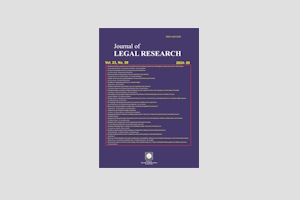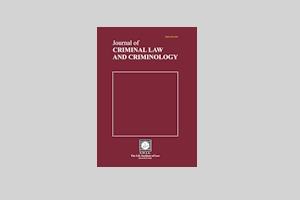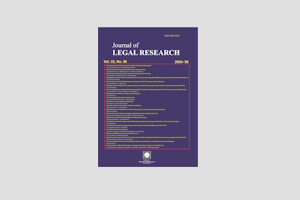Journal of
PRIVATE LAW
Number3
Vol. 2 ● No. 3
September 2014
Managing Editor: Vahid Eshtiagh
Editor-in-Chief: Seyyed Ghasem Zamani
CONTENTS
Multinational Companies, Foreign Direct Investment, Transfer And Dissemination Of Technology
Mohammad Salehi Mazandarani; Fahimeh Firozbakht
Cost Classification and the Status of Cost Recovery in Concession, Production Sharing Contracts and Risk Service Contracts
Nasrollah Ebrahimi; Saide Ghasemi Moghaddam
International Sanctions And International Commercial Contracts; By Emphasizing On Risk Management Approach
Maryam Ghanizadeh Bafghi; Vahideh Gholami
Payment of Purchase Price as Statutory Condition Precedent for Transfer of the Sold Goods Ownership? A Comparative Analysis of German Property Transfer Rules in Light of English and Australian Law
Mashaallah Bana Niasari
Independence of Bank guarantees in new commercial bill
Mahmoud Bagheri; Monir Jalali
Validity of Intellectual Property Rights Sharia Perspective In Sharia
Ghassem Mohammadi; Mohammad Mehdi Hasan
Multinational Companies, Foreign Direct Investment, Transfer And Dissemination Of Technology
Mohammad Salehi Mazandarani
Fahimeh Firozbakht
Abstract
Foreign direct investment by MNEs is an efficient way of transferring technology from the viewpoint of transferors and transferees.
There are two principal methods of technology transfer through FDI that could be used by MNEs. The first method is to transfer the technology internally to a subsidiary. The second is to enter into a joint venture with a local partner.
If the technology concerned is a core technology with a long commercial life-span and the possibility of easily being copied, the MNEs are more likely to consider FDI as an option. Transfer of technology through direct investment is more likely to be the option where developing and least developed countries are concerned, given the likely absence of suitable potential to finance the acquisition of new technology. Technology diffusion could also occur through FDI.
Keywords
Multinational Enterprises Foreign Direct Investment Transfer of Technology Technology diffusion
Cost Classification and the Status of Cost Recovery in Concession, Production Sharing Contracts and Risk Service Contracts
Nasrollah Ebrahimi
Saide Ghasemi Moghaddam
Abstract
Without a doubt, the industry of oil and gas especially in the upstream section, is one of the most expensive industry of all. It’s so important to understand the nature of petroleum costs and cost recovery in major oil and gas contracts. The multiplicity and diversity in the nature of petroleum costs at one hand and the differences in points of view and contractual agreement regarding to these costs on the other hand cause the classification and nature of petroleum costs and their recovery to be uncertain and consequently, this uncertainty will facilitate the underlying contractual conflicts between oil company as the contractor and host government. This article tries to present a certain classification of petroleum cost with considering the similarities of petroleum operations and to clarify the cost recovery status in three major petroleum contracts with reference to some contractual samples.
Keywords
Petroleum Contracts Petroleum Costs Cost Recovery Cost Ceiling
International Sanctions And International Commercial Contracts; By Emphasizing On Risk Management Approach
Maryam Ghanizadeh Bafghi
Vahideh Gholami
Abstract
Nowadays International economic sanctions are one of the means for changing behavior of governments, legal and natural individuals. Furthermore, economic sanctions are considered as the pre option of military contacts in international scope. The inquiry about the history of using economic sanctions in international extent shows sanctions have failed to achieve considerable success in changing the behaviors of its targets. However, the effects of sanctions on political, economic, social and even cultural aspects in target are not deniable. In this regard, commercial scope, especially in international commercial contracts was always one of the most important grounds for impact. Initially, force majeure has emerged as the typical defense against claim of non-performance in contracts. Meanwhile, after the extension and the length of sanction usages in different situations, there were no grounds for force major to be invoked. Therefore, activists of the scope tried to reduce the risk of economic sanctions, which means sanctions management. The management prepares the possibility of continuing commercial activities even in sanction statues. The essay is going to consider different aspects of economic sanction in commercial activities and review risk management solutions of it.
Keywords
International Commercial Contracts Economic sanctions Force Major Risk Management
Payment of Purchase Price as Statutory Condition Precedent for Transfer of the Sold Goods Ownership? A Comparative Analysis of German Property Transfer Rules in Light of English and Australian Law
Mashaallah Bana Niasari
Abstract
Retention of title clauses are common contractual devices to secure the payment of purchase price in situations where the sold goods are delivered to the buyer prior to such payment. In most legal systems, retention of title arrangements require an agreement between the buyer and the seller. Based on a comparative analysis of German law, this article argues that it would be in the best interest of all concerned parties to replace this requirement with statutory reservation of title provisions. Statutory reservation of title provisions, that is, rules according to which the payment of the purchase price is an automatic – but rebuttable and default – precondition for the transfer of title to moveable property, would only incorporate what is common contract practice into law anyway and thus eliminate the potential for errors and prevent from arising various conflicts.
Keywords
German Law Reservation of Title Payment of Price Secured Transactions
Independence of Bank guarantees in new commercial bill
Mahmoud Bagheri
Monir Jalali
Abstract
Independent bank guarantee, used to guarantee contractual obligations and one of the main tools used in international trade, is an instrument created by the international procedure and customs. Bank guarantees have some features; the most important of them is independence from original and underlying contract. It means that an obligation to pay the amount of guarantee, merely is determined by reference to the conditions set forth in the text of the guarantee and agreements and obligations of the parties under the original contract have no effect on the right of beneficiary to receive the amount of guarantee. One of the results of independence principle is that guarantor can’t refer to faults in the original contract against beneficiary and is obliged to pay the amount of guarantee, without reviewing terms of the contract and merely by realization of guarantee conditions. By obtaining interim injunction from the courts, only in a few cases, in which there is strong evidence of fraud by the beneficiary, guarantor can refuse to pay amount of guarantee. Meanwhile, the principle of independence, such as other legal principles has exceptions, most notably, the apparent fraud and abuse of the rights by the beneficiary. Regarding ratification of independence principle in bank guarantees, there are differences between international and internal regulations, under domestic laws no division is dedicated to this subject. But since the new Commercial Law Bill has dedicated articles to independent guarantees, which have differences and similarities with international rules, it seems that applying proposed amendments and final ratification can be a turning point to increase bank guarantees, therefore to increase transactions, commerce development and economic prosperity of the country.
Keywords
Principle of Independence Bank Guarantee New Commercial Code Bill Independent guarantee
Validity of Intellectual Property Rights Sharia Perspective In Sharia
Ghassem Mohammadi
Mohammad Mehdi Hasani
Abstract
Not being in the scope of Sharia which means not to identify a subject in religious texts and source of jurisprudence has no correlativity with illegality which means Sharia confliction.
Therefore, the scholars’ points of view who believe in intellectual property’s non-Sharia character may not be considered as a reason of these rights opposition to Sharia.
Validation in non-Sharia theory of intellectual property rights is imaginable in two ways: Contractual obligation and governmental mandates. While others have tried to give according to Sharia validity to this rights.
The opponents of legal validity of intellectual property rights have resorted to some arguments such as: deprivation of authority, exclusion of applicatory reasons, lack of rationality, the contradiction of ownership and thought natures. In return, supporters of legal validity of mentioned rights have rejected these arguments and cited the reasons such as: Benae- oghala (wise basing), applicatory of Jurisprudence rules such as La-Zarar (lack of harm), authority and the prohibition of other property’s seizure and hence considered these rights as a new examples. But it seems that both sides’ arguments are insufficient and need to validation solution in the case of non-Sharia.
Keywords
intellectual property rights Contractual Obligation governmental mandates Sharei Requirement Benae- oghala (wise basing)





